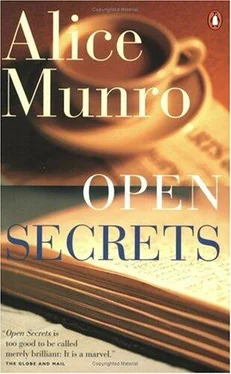Alice Munro - Open Secrets
Здесь есть возможность читать онлайн «Alice Munro - Open Secrets» весь текст электронной книги совершенно бесплатно (целиком полную версию без сокращений). В некоторых случаях можно слушать аудио, скачать через торрент в формате fb2 и присутствует краткое содержание. Год выпуска: 1994, ISBN: 1994, Издательство: McClelland & Stewart, Жанр: Проза, на английском языке. Описание произведения, (предисловие) а так же отзывы посетителей доступны на портале библиотеки ЛибКат.
- Название:Open Secrets
- Автор:
- Издательство:McClelland & Stewart
- Жанр:
- Год:1994
- ISBN:978-1-55199-396-6
- Рейтинг книги:5 / 5. Голосов: 1
-
Избранное:Добавить в избранное
- Отзывы:
-
Ваша оценка:
- 100
- 1
- 2
- 3
- 4
- 5
Open Secrets: краткое содержание, описание и аннотация
Предлагаем к чтению аннотацию, описание, краткое содержание или предисловие (зависит от того, что написал сам автор книги «Open Secrets»). Если вы не нашли необходимую информацию о книге — напишите в комментариях, мы постараемся отыскать её.
Open Secrets — читать онлайн бесплатно полную книгу (весь текст) целиком
Ниже представлен текст книги, разбитый по страницам. Система сохранения места последней прочитанной страницы, позволяет с удобством читать онлайн бесплатно книгу «Open Secrets», без необходимости каждый раз заново искать на чём Вы остановились. Поставьте закладку, и сможете в любой момент перейти на страницу, на которой закончили чтение.
Интервал:
Закладка:
The weather obliged her, and so did the man at the hotel desk, producing almost at once a tattered but cheerful guide and his underfed horse. They set out — she on the horse, the man walking ahead. The road was steep and twisting and full of boulders, the sun increasingly hot and the intervening shade cold and black. She became hungry and thought she must turn back soon. She would have breakfast with her companions, who got up late.
No doubt there was some sort of search for her, after the guide’s body was found. The authorities must have been notified — whoever the authorities were. The boat must have sailed on time, her friends must have gone with it. The hotel had not taken their passports. Nobody back in Canada would think of investigating. She was not writing regularly to anyone, she had had a falling-out with her brother, her parents were dead. You won’t come home till all your inheritance is spent, her brother had said, and then who will look after you?
When she was being carried through the pine forest, she awoke and found herself suspended, lulled — in spite of the pain and perhaps because of the raki —into a disbelieving surrender. She fastened her eyes on the bundle that was hanging from the saddle of the man ahead of her and knocking against the horse’s back. It was something about the size of a cabbage, wrapped in a stiff and rusty-looking cloth.
I heard this story in the old St. Joseph’s Hospital in Victoria from Charlotte, who was the sort of friend I had in my early days there. My friendships then seemed both intimate and uncertain. I never knew why people told me things, or what they meant me to believe.
I had come to the hospital with flowers and chocolates. Charlotte lifted her head, with its clipped and feathery white hair, toward the roses. “Bah!” she said. “They have no smell! Not to me, anyway. They are beautiful, of course.
“You must eat the chocolates yourself,” she said. “Everything tastes like tar to me. I don’t know how I know what tar tastes like, but this is what I think.”
She was feverish. Her hand, when I held it, felt hot and puffy. Her hair had all been cut off, and this made her look as if she had actually lost flesh around her face and neck. The part of her under the hospital covers seemed as extensive and lumpy as ever.
“But you must not think I am ungrateful,” she said. “Sit down. Bring that chair from over there — she doesn’t need it.”
There were two other women in the room. One was just a thatch of yellow-gray hair on the pillow, and the other was tied into a chair, wriggling and grunting.
“This is a terrible place,” said Charlotte. “But we must just try our best to put up with it. I am so glad to see you. That one over there yells all night long,” she said, nodding toward the window bed. “We must thank Christ she’s asleep now. I don’t get a wink of sleep, but I have been putting the time to very good use. What do you think I’ve been doing? I’ve been making up a story, for a movie! I have it all in my head and I want you to hear it. You will be able to judge if it will make a good movie. I think it will. I would like Jennifer Jones to act in it. I don’t know, though. She does not seem to have the same spirit anymore. She married that mogul.
“Listen,” she said. “(Oh, could you haul that pillow up more, behind my head?) It takes place in Albania, in northern Albania, which is called Maltsia e madhe, in the nineteen-twenties, when things were very primitive. It is about a young woman travelling alone. Lottar is her name in the story.”
I sat and listened. Charlotte would lean forward, even rock a little on her hard bed, stressing some point for me. Her puffy hands flew up and down, her blue eyes widened commandingly, and then from time to time she sank back onto the pillows, and she shut her eyes to get the story in focus again. Ah, yes, she said. Yes, yes. And she continued.
“Yes, yes,” she said at last. “I know how it goes on, but that is enough for now. You will have to come back. Tomorrow. Will you come back?”
I said, yes, tomorrow, and she appeared to have fallen asleep without hearing me.
The kula was a great, rough stone house with a stable below and the living quarters above. A veranda ran all the way around, and there would always be an old woman sitting there, with a bobbin contraption that flew like a bird from one hand to the other and left a trail of shiny black braid, mile after mile of black braid, which was the adornment of all the men’s trousers. Other women worked at the looms or sewed together the leather sandals. Nobody sat there knitting, because nobody would think to sit down to knit. Knitting was what they did while they trotted back and forth to the spring with their water barrels strapped to their backs, or took the path to the fields or to the beech wood, where they collected the fallen branches. They knitted stockings — black and white, red and white, with zigzag patterns like lightning strokes. Women’s hands must never be idle. Before dawn they pounded the bread dough in its blackened wooden trough, shaped it into loaves on the backs of shovels, and baked it on the hearth. (It was corn bread, unleavened and eaten hot, which would swell up like a puffball in your stomach.) Then they had to sweep out the kula and dump the dirty ferns and pile up armloads of fresh ferns for the next night’s sleep. This was often one of Lottar’s jobs, since she was so unskilled at everything else. Little girls stirred the yogurt so that lumps would not form as it soured. Older girls might butcher a kid and sew up its stomach, which they had stuffed with wild garlic and sage and apples. Or they would go together, girls and women, all ages, to wash the men’s white head scarves in the cold little river nearby, whose waters were clear as glass. They tended the tobacco crop and hung the ripe leaves to dry in the darkened shed. They hoed the corn and cucumbers, milked the ewes.
The women looked stern but they were not so, really. They were only preoccupied, and proud of themselves, and eager for competition. Who could carry the heaviest load of wood, knit the fastest, hoe the most rows of cornstalks? Tima, who had looked after Lottar when she was sick, was the most spectacular worker of all. She would run up the slope to the kula with a load of wood bound to her back that looked ten times as big as herself. She would leap from rock to rock in the river and pound the scarves as if they were the bodies of enemies. “Oh, Tima, Tima!” the other women cried out in ironic admiration, and “Oh, Lottar, Lottar!” in nearly the same tones, when Lottar, at the other end of a scale of usefulness, let the clothes drift away downstream. Sometimes they whacked Lottar with a stick, as they would a donkey, but this had more exasperation in it than cruelty. Sometimes the young ones would say, “Talk your talk!” and for their entertainment she would speak English. They wrinkled up their faces and spat, at such peculiar sounds. She tried to teach them words—“hand,” “nose,” and so on. But these seemed to them jokes, and they would repeat them to each other and fall about laughing.
Women were with women and men were with men, except at times in the night (women teased about such times were full of shame and denial, and sometimes there would be a slapping) and at meals, when the women served the men their food. What the men did all day was none of women’s business. Men made their ammunition, and gave a lot of care to their guns, which were in some cases very beautiful, decorated with engraved silver. They also dynamited rocks to clear the road, and were responsible for the horses. Wherever they were, there was a lot of laughing, and sometimes singing and firing off of blanks. While they were at home they seemed to be on holiday, and then some of them would have to ride off on an expedition of punishment, or to attend a council called to put an end to some particular bout of killing. None of the women believed it would work — they laughed and said that it would only mean twenty more shot. When a young man was going off on his first killing, the women made a great fuss over his clothes and his haircut, to encourage him. If he didn’t succeed, no woman would marry him — a woman of any worth would be ashamed to marry a man who had not killed — and everyone was anxious to have new brides in the house, to help with the work.
Читать дальшеИнтервал:
Закладка:
Похожие книги на «Open Secrets»
Представляем Вашему вниманию похожие книги на «Open Secrets» списком для выбора. Мы отобрали схожую по названию и смыслу литературу в надежде предоставить читателям больше вариантов отыскать новые, интересные, ещё непрочитанные произведения.
Обсуждение, отзывы о книге «Open Secrets» и просто собственные мнения читателей. Оставьте ваши комментарии, напишите, что Вы думаете о произведении, его смысле или главных героях. Укажите что конкретно понравилось, а что нет, и почему Вы так считаете.












